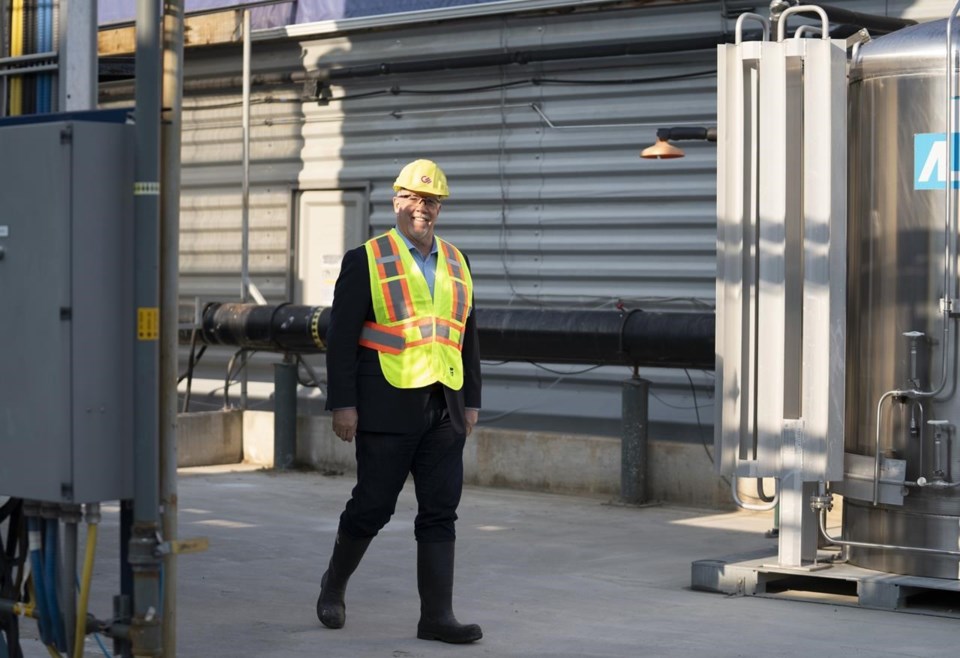SQUAMISH, B.C. — A re-elected NDP government would commit to net-zero carbon emissions by 2050, John Horgan promised Friday as the environment and natural resources took centre stage in all three main party campaigns.
Horgan made the announcement during a stop in Squamish while B.C. Liberal Leader Andrew Wilkinson announced support for the beleaguered forestry industry in Merritt.
Horgan said the commitment builds on the existing CleanBC plan developed in partnership with the Green caucus.
Using 2007 as a baseline, B.C. is already committed through legislation to reduce emissions by 40 per cent by 2030, 60 per cent by 2040 and 80 per cent by 2050.
"It means not only will we meet our reduction targets, but we will also aggressively go to make sure any new emissions are offset by either sequestration or some other technologies to make sure that net-zero allows our economy to continue to grow and also addresses the challenge of further greenhouse gas emission," he said.
But Green Leader Sonia Furstenau said the net-zero emission promise is meaningless without a plan for how to get there.
Studies suggest that when the NDP-backed LNG Canada project is factored in, emissions from oil and gas production will exceed B.C.'s existing 2050 target by 160 per cent, even if all other emissions are reduced to zero by 2035, she said in a news release.
The $40-billion LNG Canada export terminal bills itself as the largest private infrastructure project in Canadian history.
"There are some significant problems with what they are proposing," Furstenau said during a media availability at the Malahat summit in the Cowichan Valley.
"The biggest problem with CleanBC is we can only get to 75 per cent of our legislated targets because of LNG Canada."
The Greens are the only party committed to ending subsidies for oil and gas industries and moving urgently to transition the economy, which would ensure resource workers have stable work, she said.
"That cannot move forward with, as the NDP chose to, the largest point source emission project in Canada at a time when the skies behind me are still filled with smoky haze because of the climate fires from the western United States," she said.
The Pembina Institute, which supports a transition to clean energy, said comprehensive annual reporting is critical if British Columbia wants to assess its success at bringing carbon pollution down.
"We simply can't afford to keep missing targets for reducing carbon pollution," B.C. director Karen Tam Wu said in a statement.
"All parties must put forward a robust plan to achieve B.C.'s climate 2030 target to have any hope of flattening the carbon-pollution curve by 2050 and positioning British Columbia for a stable future in the face of global disruptions."
Horgan said the NDP commitment doesn't mean banning new industrial emissions, but they must be balanced.
"If there's going to be an increase in emissions on the industrial side from one sector, that means it has to be balanced by a decline in emissions from another sector," he said.
Reaching the net-zero carbon goal would also "present opportunities" for the province, including creating jobs while reducing air pollution, he said.
On forestry, Wilkinson said a B.C. Liberal government would work with the federal government to address both stumpage and market pricing at the same time as addressing the softwood lumber dispute.
A Liberal plan would include a revision of stumpage fees and he gave Alberta as an example of a province that adjusts the fees monthly.
"For some reason, the NDP have locked us into this annual revision of stumpage that means very huge lags and delays. When the price of lumber goes up and down, that means the pricing of stumpage is inappropriate within months."
A Liberal government would also expedite certification of wood products used in multi-level construction projects, pass legislation to protect the working forest and fund silviculture, Wilkinson said, although he did not release specifics.
Wilkinson added that the province's resource projects need certainty and the Liberals would put an end to obstructions to Trans Mountain and other projects that have been approved.
"Having the courts ignored and having chaos in British Columbia is simply not acceptable," he said.
This report by The Canadian Press was first published Oct. 2, 2020.
Amy Smart, The Canadian Press


